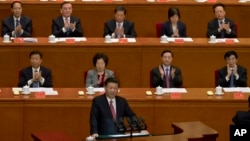China says it will soon launch a powerful anti-corruption system in the capital city of Beijing and the provinces of Shanxi and Zhejiang.
Officials say the new scheme is designed to be more independent, with supervision commissions to oversee public officeholders, including within the judicial system.
Some observers praise the establishment of the new scheme, calling it a positive step toward a more integrated and autonomous watchdog system. Others doubt if the commission can be independent of the party and worry that with its expansive powers it may lead to more corruption.
“In China, almost more than 98 percent of comrade leaders or public officeholders are [Communist] party members. So, it’s common in China that the party always overrides the government to have a full grip on power,” Liao Ran, senior program coordinator of Transparency International, told VOA.
The new scheme has more to do with the party’s continued rule in China than Chinese President Xi Jinping’s own grip of power, the Oslo, Norway-based observer added, dismissing concerns that the move was connected to power struggles within the party.
State supervisory reform
The National People’s Congress (NPC) Standing Committee on Sunday approved a pilot reform program to centralize the nation’s supervisory bodies in a bid to step up the nation’s efforts to counter deep-seated graft.
Under the program, supervisory commissions will be established at both the central and provincial level that will report to the NPC. They will run independently from the central and local governments, the judicial and the procuratorate branches to provide a check on public office holders nationwide.
The commissions, whose chairperson and deputies will be appointed by the NPC and their respective local chapters, are further designed to integrate the power and duties of the government’s existing anti-graft agencies, including the supervision department and the corruption prevention department.
They will be charged with investigating and punishing bribery, dereliction of duty and prevention of duty-related crimes by those on government payrolls, while transferring cases involving suspected criminal offenses to prosecutors for further court trials, according to state media Xinhua News.
The pilot program will be put to a test in Beijing and the provinces of Shanxi and Zhejiang first before a national rollout.
Expansive powers
With expanded power, the status of the new anti-graft institution will rise in the political hierarchy and enjoy the same legal footing as the government. That, by design, will make it more independent, said Ho Bing, a law professor at China University of Political Science and Law.
“The former design put the supervision department under the government, which wasn’t given enough autonomy,” Ho said, “The new design will heighten the newly created supervision committees’ level of independence, which, in a way, puts the [government’s] anti-graft work on the right track.”
The professor, however, warned of potential conflicts between the commission and the court, as the new body will be charged with censuring corrupt court officials, whose criminal offenses will then be tried in the court.
“The future relation between the commission and the court is hinged on the independence of judges or how to safeguard the impartiality of judges. Both the impartiality of judges and supervision committee should be upheld, which may lead to conflict,” the professor added.
Transparency International’s Liao Ran, in addition, argued that because the new supervisory system is under the NPC’s monitor it may bend easier to the will of party-elected members, who often serve to ratify decisions handed down by the state.
“China’s NPC has long been known as a rubber-stamp [parliament]. The parliament, which has no solid power, is now asked to supervise a [government] watchdog. So, how effective the commission will be remains to be seen,” he added.
More corruption?
Lu Liangbiao, a lawyer with Dacheng Law Office in Beijing, described the new plan to tackle corruption as “a risky move” and questioned the new body’s check-and-balance of powers.
Lu wrote Wednesday on his WeChat micromessaging account that the new mechanism, deeply imbedded within the power structure, is like “shooing away flies on a pile of dung” and may lead to more corruption given the new scheme’s expansive powers.
He concluded that any efforts to counter graft will only succeed in a full-fledged democracy where the rule of law is respected, the judiciary system runs independently and the general public’s participation is guaranteed along with the free press and sound elected representation.
In contrast, the ruling Communist party said the country’s fight against corruption has gained “crushing momentum” and huge progress has been achieved, with no let up expected in 2017, state media Xinhua News reported late Wednesday, following a meeting of the party’s Politburo, chaired by Xi.
Since coming to power in 2012, Xi has waged war against deep-rooted graft, a problem he warned could affect the party’s long-term grip on power








